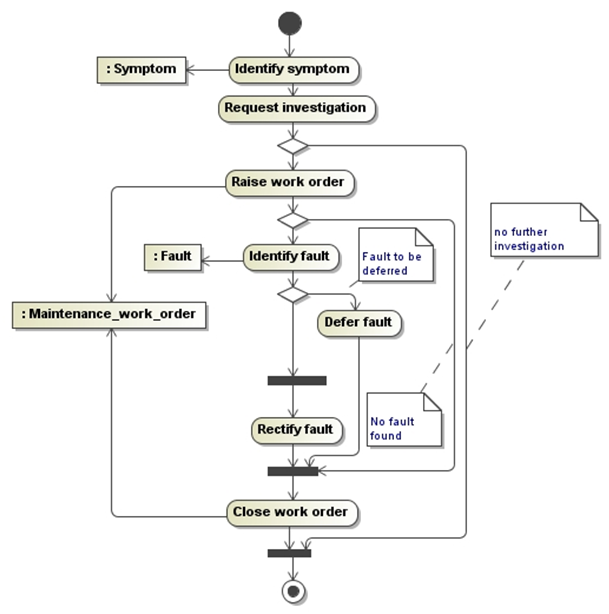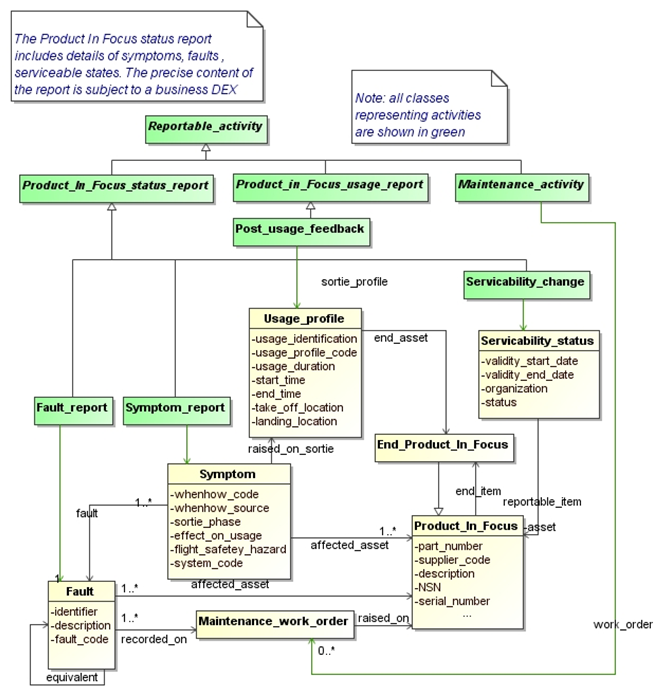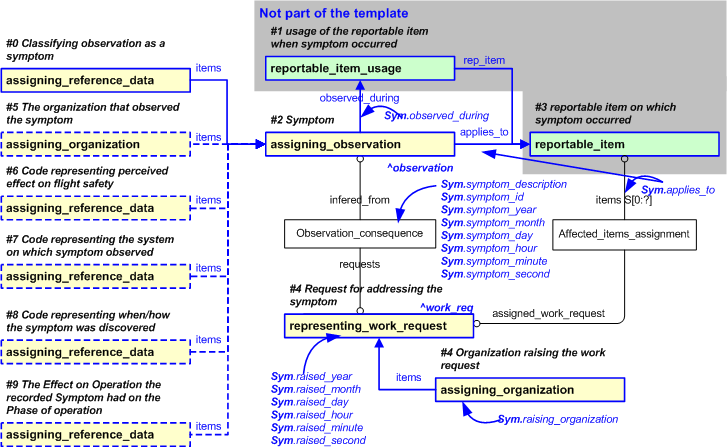Template:— symptom (sym)
Context:— MoDAvDEX |
Date: 2008/01/31 17:32:18
Revision: 1.7
|
This section specifies the template symptom.
NOTE
The template has been defined in the context of
MoDAvDEX.
Refer to the business context for details of related templates.
NOTE
An explanation of a template and the associated instantiation path is
provided in the
Template overview
section.
This template describes how to represent a symptom.
The EXPRESS-G diagram in
Figure
3
shows the templates and EXPRESS entities that are required
to represent the template
"symptom".
The text highlighted in blue shows the template parameters.
Figure 3 — An EXPRESS-G representation of the Information model for symptom
The graphic for the template to be used in other EXPRESS-G diagrams
is shown in Figure
4
below.
Figure 4 — The graphical representation of the symptom template
The following input parameters are defined for this template:
An identification for the symptom.
The organization raising the symptom
A textual description of the symptom
Calendar_date year_component. The year the symptom was identified.
Calendar_date month_component. The month the symptom was identified.
Calendar_date day_component. The day the symptom was identified.
Local_time hour_component of the date and time. The hour the symptom was identified.
Local_time minute_component of the date and time. The minute the symptom was identified.
This parameter is optional. If not given, it will remain unset.
Local_time second_component of the date and time. The second the symptom was identified.
This parameter is optional. If not given, it will remain unset.
Calendar_date year_component. The year a request to address the symptom was raised .
Calendar_date month_component. The month a request to address the symptom was raised .
Calendar_date day_component. The day a request to address the symptom was raised .
Local_time hour_component of the date and time. The hour a request to address the symptom was raised .
Local_time minute_component of the date and time. The minute a request to address the symptom was raised .
This parameter is optional. If not given, it will remain unset.
Local_time second_component of the date and time. The second a request to address the symptom was raised .
This parameter is optional. If not given, it will remain unset.
The activity that the reportable item was undertaking when the symptom was discovered.
The reportable item on which the symptom was observed.
The following reference parameters are defined for this template:
Allow the
Observation
entity instantiated in this path to be referenced when this template is used.
Note: The
Observation
entity can be referenced in a template path by:
%^target = $symptom.observation%
where
target
is the parameter to which the
Observation
is bound.
Allow the
Work_request
entity instantiated in this path to be referenced when this template is used.
Note: The
Work_request
entity can be referenced in a template path by:
%^target = $symptom.work_req%
where
target
is the parameter to which the
Work_request
is bound.
The instantiation path shown below specifies the entities that are to be
instantiated by the template.
A description of templates and the syntax for the instantiation path is
provided in the
Templates Help/Information section.
/
representing_work_request(
id=@symptom_id,
id_class_name='Work_request_identification_code',
id_ecl_id='urn:plcs:rdl:std',
org_id=@raising_organization,
org_id_class_name='Organization_identification_code',
org_id_ecl_id='urn:plcs:rdl:std',
version_id='NULL',
version_id_class_name='Version_identification_code',
version_id_ecl_id='urn:plcs:rdl:std',
version_org_id=@raising_organization,
version_org_id_class_name='Organization_identification_code',
version_org_id_ecl_id='urn:plcs:rdl:std',
date_class_name='Work_request_issue_date',
date_ecl_id='urn:plcs:rdl:std',
year=@request_year,
month=@request_month,
day=@request_day,
hour=@request_hour,
minute=@request_minute,
second=@request_second,
sense='.EXACT.',
hour_offset='0',
minute_offset='0',
state_class_name='State_of_work_request',
state_ecl_id='urn:plcs:rdl:std',
purpose='symptom',
purp_ecl_id='urn:plcs:rdl:LITS')/
%^work_req = $representing_work_request.work_req%
Affected_items_assignmentAffected_items_assignment.assigned_work_request ->
^work_req
Affected_items_assignment.items ->
@applies_to/
assigning_organization(
org_id=@raising_organization,
org_id_class_name='Organization_identification_code',
org_id_ecl_id='urn:plcs:rdl:std',
org_assgn_class_name='Requestor_of',
org_assgn_ecl_id='urn:plcs:rdl:std',
items=^work_req)/
%^organization = $assigning_organization.organization%
%^organization_assgn = $assigning_organization.organization_assgn%
/
assigning_observation(
id=@symptom_id,
id_class_name='Observation_identification_code',
id_ecl_id='urn:plcs:rdl:std',
org_id=@raising_organization,
org_id_class_name='',
org_id_ecl_id='urn:plcs:rdl:std',
descr=@symptom_description,
dsc_class_name='Description',
dsc_ecl_id='urn:plcs:rdl:std',
date_class_name='Date_actual_observation',
date_ecl_id='urn:plcs:rdl:std',
year=@symptom_year,
month=@symptom_month,
day=@symptom_day,
hour=@symptom_hour,
minute=@symptom_minute,
second=@symptom_second,
sense='.EXACT.',
hour_offset=0,
minute_offset=0,
applies_to=@applies_to,
related_records='',
observed_during=@observed_during,
observed_by='',
in_context='')/
%^observation = $assigning_observation.observation%
%^observation_item = $assigning_observation.observation_item%
Observation_consequenceObservation_consequence.id = '/IGNORE'
Observation_consequence.name = '/IGNORE'
Observation_consequence.role = '/IGNORE'
Observation_consequence.infered_from ->
^observation
Observation_consequence.requests ->
^work_req
/
assigning_reference_data(
class_name='Symptom',
ecl_id='urn:plcs:rdl:std',
items=^observation)/
The following entities are instantiated with attributes as specified:
The following section details how the
symptom
template can be optionally characterized by assigning
other constructs to it. These are characterizations commonly
applied to the template. The ISO 10303-239 EXPRESS model may enable
other assignments to the entities instantiated by the template.
The following characterizations may apply:
Characterization Observer
NOTE this characterization is optional.
Characterization Assigning reference data
NOTE this characterization is optional.
In order to distinguish between the different types of observations, the
Observation
can be classified by using the template
assigning_reference_data.
In particular, template #6 is used to represent the perceived effect on flight safety,
template #7 is used to represent the system on which the code was observed,
template #8 is used to represent the when/how code indicating how the symptom was
discovered,
template #9 is used to represent the effect on operation the recorded symptom had on the phase of operation.



